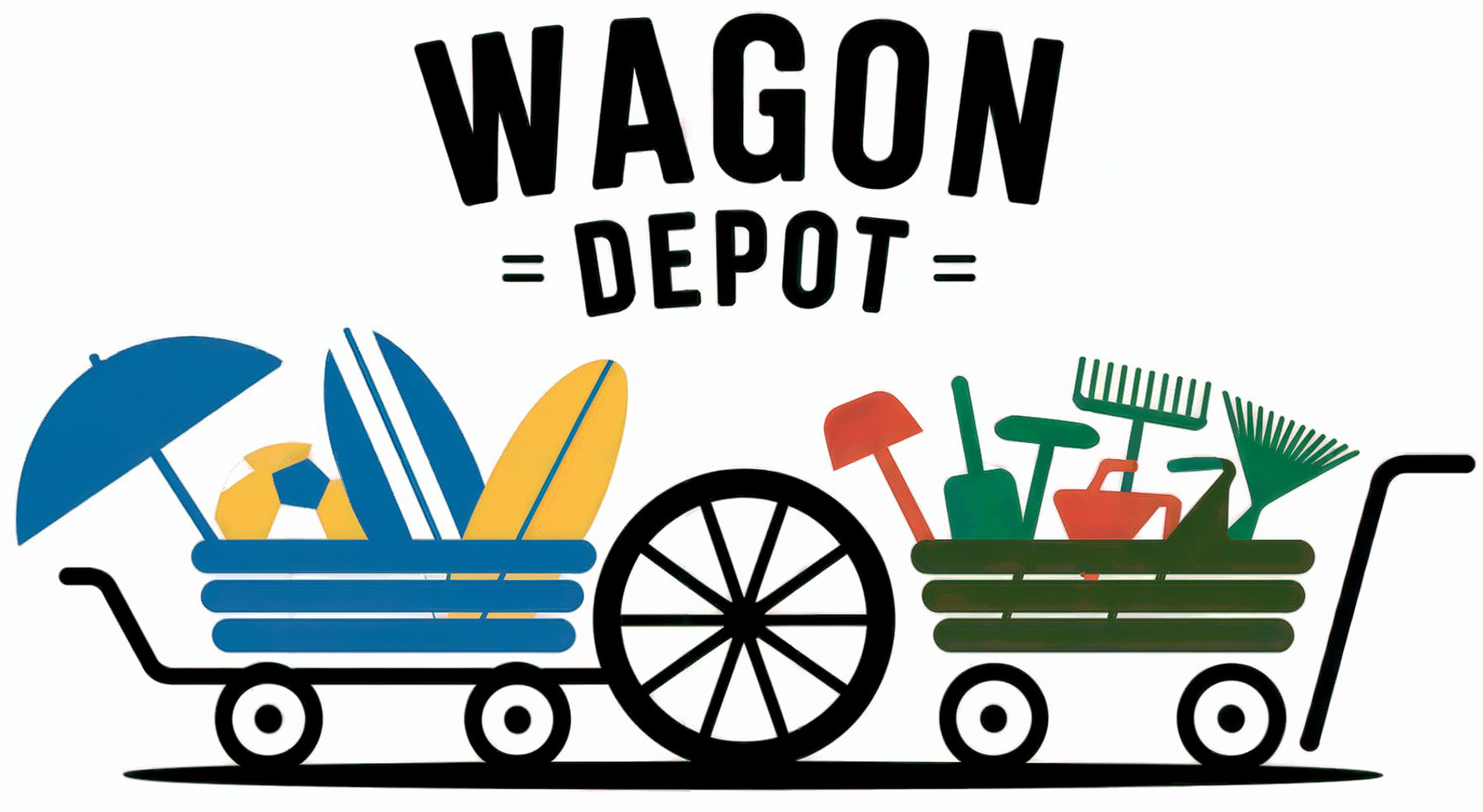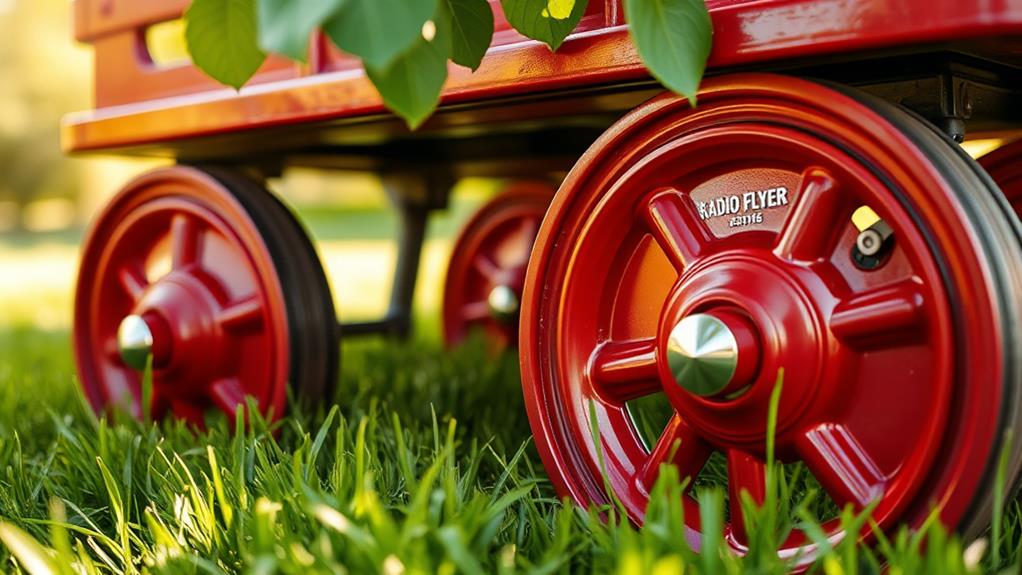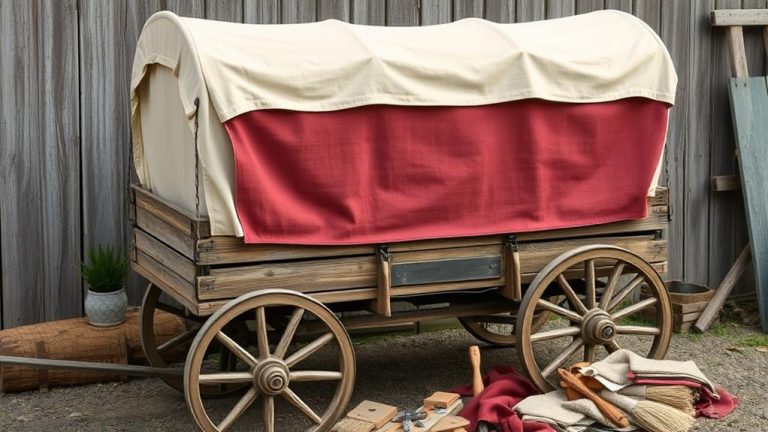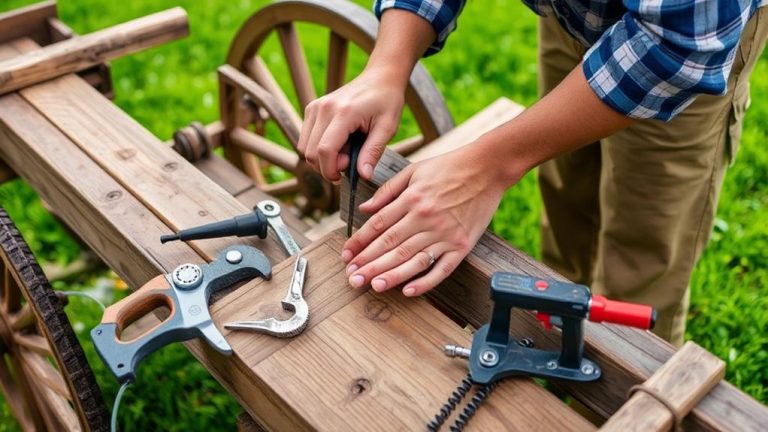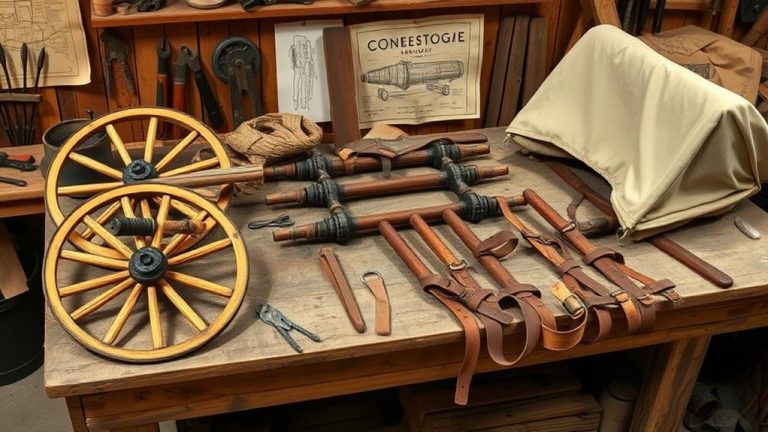To guarantee your Red Radio Flyer wagon wheels perform flawlessly, focus on five vital tips. First, choose the right replacement wheels based on material and terrain. Next, inspect axles regularly for any signs of wear or damage. Maintaining proper tire pressure is imperative; under- or over-inflation can cause issues. Moreover, clean and lubricate the wheels periodically for smooth operation. Finally, store your wagon properly, making sure it’s dry and off the ground to prevent corrosion. Following these guidelines will improve your wagon’s performance and safety, and there’s much more to explore for better care and maintenance. Additionally, checking for any loose nuts or bolts ensures that your red Radio Flyer wagon wheels remain securely attached and function optimally. If you frequently use your wagon on rough terrain, consider upgrading to more durable wheels designed for enhanced stability. By staying proactive with maintenance, you can extend the lifespan of your red Radio Flyer wagon wheels and enjoy a smoother ride for years to come.
Choose the Right Replacement Wheels
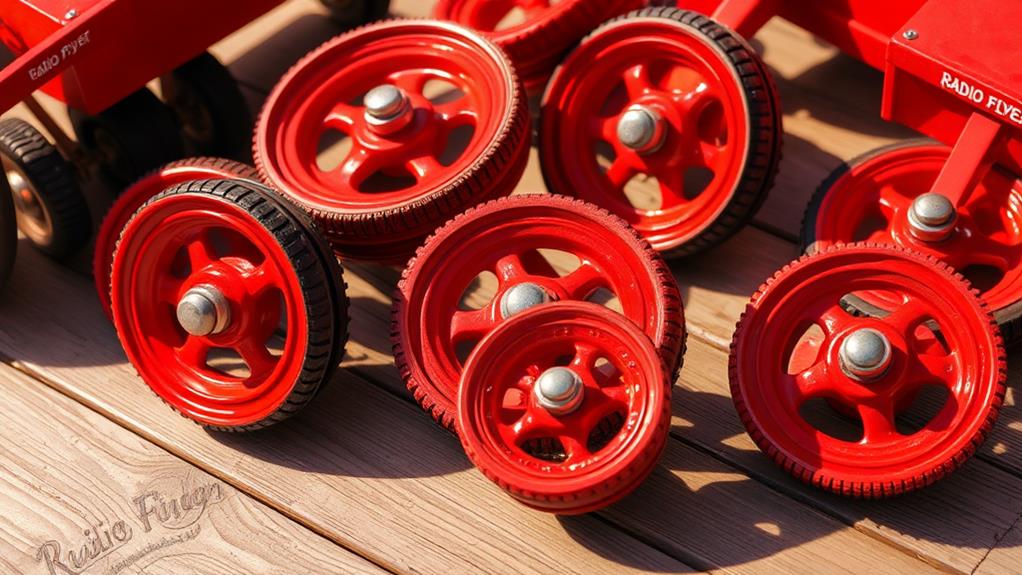
In the matter of selecting the appropriate replacement wheels for your Radio Flyer wagon, it is vital to evaluate several key factors to guarantee peak performance and safety. One of the primary considerations is the wheel material options available. You'll find materials like plastic, rubber, and foam, each offering distinct advantages and disadvantages. Plastic wheels are lightweight and cost-effective but may lack the best traction or shock absorption. Rubber wheels, although heavier, excel in providing a smoother ride and better grip, particularly on uneven surfaces. Foam wheels strike a balance, offering a lightweight option with decent shock absorption.
Next, you must consider wheel size considerations. The diameter of the wheels affects both maneuverability and stability. Larger wheels can navigate obstacles more easily and perform better on rough terrain, whereas smaller wheels may provide a tighter turning radius and are typically lighter. It is important to match the wheel size to your specific needs and the terrain where you'll be using your wagon. By carefully weighing these factors, you can guarantee that your replacement wheels not only improve the functionality of your Radio Flyer wagon but also contribute to a safer and more enjoyable experience.
Inspect Wheel Axles Regularly
Regularly inspecting the wheel axles of your Radio Flyer wagon is vital for guaranteeing ideal performance and safety during use. The axles serve as the backbone of your wagon's movement, and their condition directly impacts wheel alignment and overall efficiency. Start by examining each axle for signs of wear or damage, such as bending or rust. A compromised axle can lead to misalignment, causing uneven tire wear and potentially hazardous handling.
Additionally, check the axle's attachment points to verify they're secure. Loose connections can weaken axle durability, leading to more significant issues down the line. If you notice any irregularities, consider tightening or replacing the affected components to maintain peak functionality.
Pay attention to the spacing between the wheels and the body of the wagon. Proper wheel alignment is vital for smooth navigation, especially when carrying loads. Misalignment can result in increased friction and drag, making your wagon harder to pull and less efficient.
Maintain Proper Tire Pressure
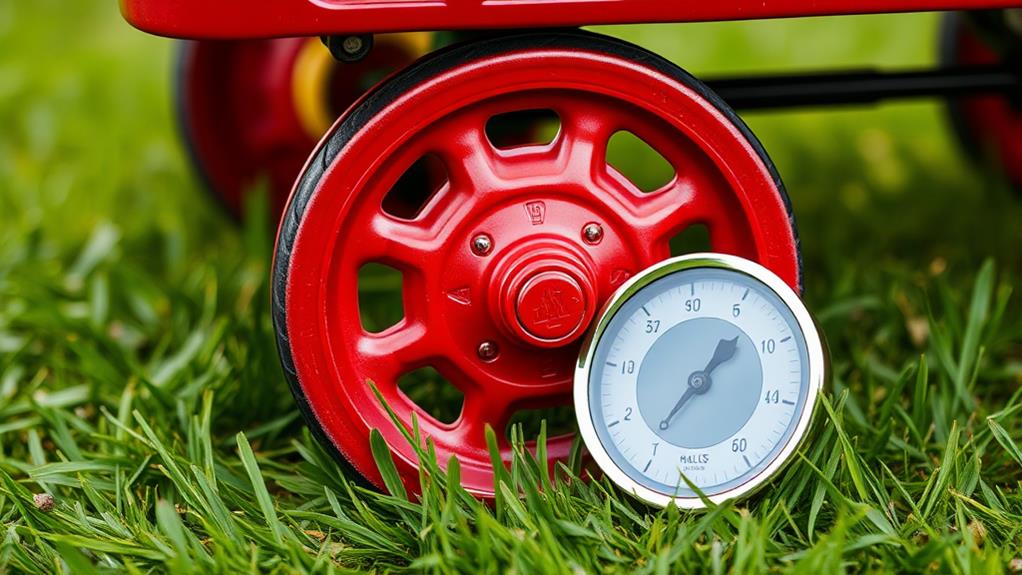
Maintaining proper tire pressure is another key aspect of ensuring your Radio Flyer wagon operates smoothly and safely. Adequate tire pressure affects not merely the performance of the wagon but likewise its safety on various terrains. Under-inflated tires can lead to increased rolling resistance, making it harder to pull your wagon, whereas over-inflated tires can compromise traction and stability.
To check tire pressure, you should use a reliable gauge. The ideal pressure range is often indicated on the tire sidewall or in your wagon's manual. Regularly monitoring tire pressure helps maintain ideal wheel alignment, preventing uneven wear on the tires and ensuring a more comfortable ride. Poor wheel alignment can lead to excessive strain on the wagon's components, increasing the likelihood of mechanical issues over time.
It's advisable to check the tire pressure before each use, especially if the wagon has been stored for an extended period. If you notice significant discrepancies, adjust the pressure accordingly or consult a professional for further inspection. By prioritizing proper tire pressure, you'll improve your wagon's performance and extend its lifespan, allowing you the freedom to enjoy countless adventures.
Clean and Lubricate Wheels
How often do you take the time to clean and lubricate your Radio Flyer wagon wheels? Regular wheel cleaning and lubrication are crucial for maintaining their performance and longevity. Here are three key steps to follow:
- Wheel Cleaning: Start by removing the wheels from the axle for thorough cleaning. Use warm, soapy water and a soft brush to eliminate dirt and grime. Rinse well and allow them to dry completely.
- Lubricant Types: Once clean, choose the right lubricant. Silicone spray, lithium grease, or a specialty wheel lubricant can effectively reduce friction. Apply a small amount to the axle and the hub area, making sure it penetrates well.
- Reassembly and Test: After lubricating, reattach the wheels. Spin them to check for smoothness. If there's resistance, you may need to adjust or reapply lubricant.
Taking these steps will make certain your wagon wheels remain in top condition, promoting smooth rides and enhancing your freedom to explore. Regular maintenance not just extends the life of your wheels but guarantees a safe and enjoyable experience for you and your little ones.
Store Wagons Properly
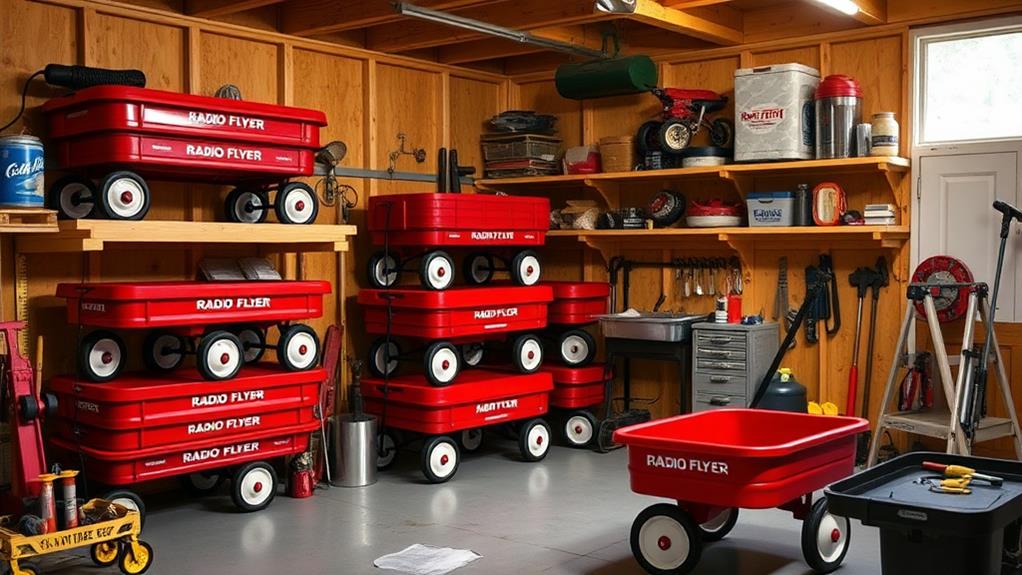
Proper storage of your Radio Flyer wagon can greatly extend its life and functionality. To guarantee your wagon remains in top condition, focus on effective wheel storage and seasonal maintenance. Start by cleaning the wheels thoroughly before storing them. This prevents dirt and grime from causing corrosion, which can diminish performance and longevity.
When storing your wagon, choose a dry, cool location. Avoid damp or humid areas, as moisture can lead to rust on the wheels and other metal components. If you can, raise the wagon slightly off the ground using blocks or a platform to further protect it from moisture.
Consider covering your wagon with a breathable tarp or cloth to shield it from dust and debris, yet allow airflow. During seasonal changes, particularly before winter, inspect the wheels and perform any necessary maintenance, like lubrication. Rotating the wagon periodically can likewise help prevent flat spots on the tires.
Frequently Asked Questions
How Do I Know When to Replace My Wagon Wheels?
In regards to your wagon wheels, think of them as the heartbeat of your ride. If you notice wobbling, excessive wear, or cracks, it's time for new wheels. Regular wheel maintenance is crucial for safety and performance. Depending on the wheel types, some may require more frequent checks. Inspect them periodically, and if they show signs of damage or wear, don't hesitate to replace them for a smoother trip ahead.
Can I Use Non-Radio Flyer Wheels for My Wagon?
You can use non-Radio Flyer wheels for your wagon, but you need to evaluate wheel compatibility carefully. Not all wheels will fit or function properly, which could affect the wagon's performance and safety. Explore various replacement options, ensuring they match the required dimensions and weight capacity. Always prioritize quality and durability; this way, you can enjoy your wagon without worrying about potential issues during use.
What Materials Are Best for Wagon Wheels?
When considering what materials are best for wagon wheels, you'll encounter various wheel material options like plastic, rubber, and wood. Each has its advantages and durability factors. Plastic wheels are lightweight but may wear out quickly, whereas rubber offers better grip and shock absorption, enhancing performance on uneven terrain. Wooden wheels provide a classic look but can be heavy and require maintenance. In the end, choose a material that balances durability and functionality for your needs.
Are There Any Weight Limits for My Wagon's Wheels?
When it pertains to wagon wheels, think of them as the sturdy foundation of a house; they need to bear the weight without faltering. Each wagon has a specific weight capacity, so it's essential to know yours. Exceeding this limit can lead to wheel damage or safety hazards. Regular wheel maintenance, like checking for wear and tear, guarantees they stay reliable, allowing you the freedom to transport your treasures without worry.
How Can I Enhance the Aesthetics of My Wagon Wheels?
To improve the aesthetics of your wagon wheels, consider wheel painting to give them a fresh, lively look. Choose colors that complement your wagon's overall design. Furthermore, decorative decals can add a personal touch, making your wagon stand out. When applying decals, make sure the surfaces are clean for better adhesion. This approach not just raises the visual appeal but also reflects your individual style, allowing for a unique expression of creativity and freedom.
